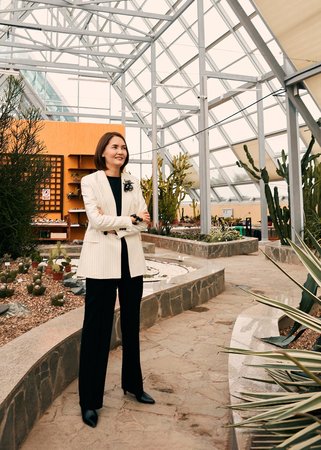



Altynay Abdykerimova (Kyrgyzstan)
Shosaboiyeva Mehrangez (Tajikistan)
Gulnara Bakhtybayeva (Kazakhstan)
Anara Sultangaziyeva (Kyrgyzstan)
Uzakova Shiringul (Uzbekistan)
Kholikzoda Mavdzhuda (Tajikistan)
Nalibayeva Gulzhan (Kazakhstan)
Zholdayakova Saule (Kazakhstan)
Zhenishkul Imanakunova (Kyrgyzstan)
Kundus Kyrbasheva (Kyrgyzstan)
Nurzat Abdyrasulova (Kyrgyzstan)
Eleonora Kazakova (Kyrgyzstan)
Elvira Borombayeva (Kyrgyzstan)
Yulia Kovalevskaya (Uzbekistan)
Umurzokova Kanoathon (Uzbekistan)
Saidkhodzhayeva Malika (Uzbekistan)
Meet Ainur Sospanova, Chairman of the Board of Directors of RES Association QAZAQ GREEN, Head of the Consulting Company Smart Volt LLP, who was involved in the creation of the RES sector in the Republic of Kazakhstan

My professional career started as a computer science teacher at the Eurasian University. At that time, IT was a new trend in technologies and I enjoyed learning new knowledge, pushing the boundaries of computer science to students of different disciplines, teaching them the basics of programming and solving applied problems.
Later I worked in IT companies and participated in national and international IT projects in Kazakhstan.
In 2009, I participated in the UNDP GEF competition for the position of wind power engineering Project Manager. At that time, wind power engineering seemed to me to be a trending in technology, just like IT in the early 1990s.
Later, when I gradually studied RES, headed the RES department in the Ministry of Environmental Protection and the Ministry of Energy, I began to understand the importance of RES for the preservation of humanity as a species, for the planet as a whole, for the prevention of climate change and the historical context of the energy transition. In the early stages of RES development in Kazakhstan, I am proud to have been an active participant in this process, despite significant opposition of traditional energy industry (coal miners, oil companies and representatives of the traditional power industry). The importance of the energy transition was gradually understood by experienced energy experts and I learnt a lot from them, sometimes even debating and arguing with them. I was pleasantly surprised at how passionate and professional the people who have developed Kazakhstan’s energy industry are. They are the ones who inspired me to learn and grasp new knowledge.
Professionals such as Bolotov A.V., Dzhaksaliyev B.M., Doroshin G.A., Kapenov N.N., Nurmaganbetov Zh.D., Turganov D.N., Trofimov A.S., Tyutebayev S.S., Shkarupa A.V. played an important role in my formation and development of the RES sector, and I had a great confidence of my superiors, the late Minister of Environment Kapparov N.D. and Minister of Energy Bozumbayev K.A., who believed in RES and supported my ideas, which allowed the RES sector in Kazakhstan to position itself within the national energy sector and achieve good results. Today, our country has many solar, wind, water, and biomass power plants. I am proud to say that this is the result of my efforts.
Now, as Chairman of the Board of RES Association Qazaq Green and Head of Smart Volt Consulting Company, I continue to influence the energy transition process in our country and region. By actively working not only with energy companies, but also with oil companies adopting low-carbon development strategies, we are giving a fresh impetus to the development of RES, including large and small distributed generation.

of the 25 senior officials (Minister, Vice-Ministers, Department Directors, Committee Chairmen), only 3 of us were women. This shows that it is more difficult for women to progress in their careers and that men progress faster in their careers.
Moment of inspiration
An important success factor for me is expertise in the field I work in. This can mostly be achieved through good basic education and continuous learning in the field, which has kept me confident and able to take responsibility for different tasks.
Another important success factor, especially early in my career, is my willingness to go above and beyond what my job description required, which helped me gain the trust of my supervisors.
In addition, it is also important to have good communication and analytical skills. This is because in the exact science it is important to have a logical and analytical mindset. This allows me to summarize and communicate my thoughts clearly, analyze information and create complex documents.
Of course, it is also important for a manager to be able to listen and be heard, which, along with flexibility, makes it possible to succeed in the profession.
But for me, the key to success is to be involved in activities I enjoy.
Acknowledged success
One of my favorite quotes in life that helps me focus on wisdom is “Beauty is in the eye of the beholder” by Oscar Wilde.
I also truly believe in the power of new technology. That is why I agree with the words of the late Ahmed Zaki Ramani, former Minister of Energy of the Kingdom of Saudi Arabia: “The Stone Age did not end because we ran out of stones, and the oil age will not come to an end because the oil will run out”.
My personal success lies in the recognition of my expertise and the respect I have earned from many colleagues who have become my friends and like-minded colleagues. I am also often referred to as “Mother of RES in Kazakhstan”, which is a great honor for me. External manifestations of my success include numerous industry awards, being named one of the top 50 women leaders in the energy sector in 2019 and being named one of the top 30 decarbonization leaders in 2022. I also have the state award of the Republic of Kazakhstan - I am a Commander of the Kurmet Order.
If we talk about gender balance in the energy sector in Central Asia, in my opinion, this is a very important factor, not only for the sustainable economic development of countries, but also for the development of a healthy society, family and youth.
Girls and young women should bravely choose STEM-related specialties without fear of gender discrimination of any kind. With strong knowledge, a desire to take their country forward and seeking a profession that excites them, everyone can become a good professional, regardless of external factors.
The energy transition from polluting energy generation to cleaner energy sources is underway across Central Asia and this market will create new green workplaces. If women can be part of this workforce, it will be a fair transition, including from a gender perspective.